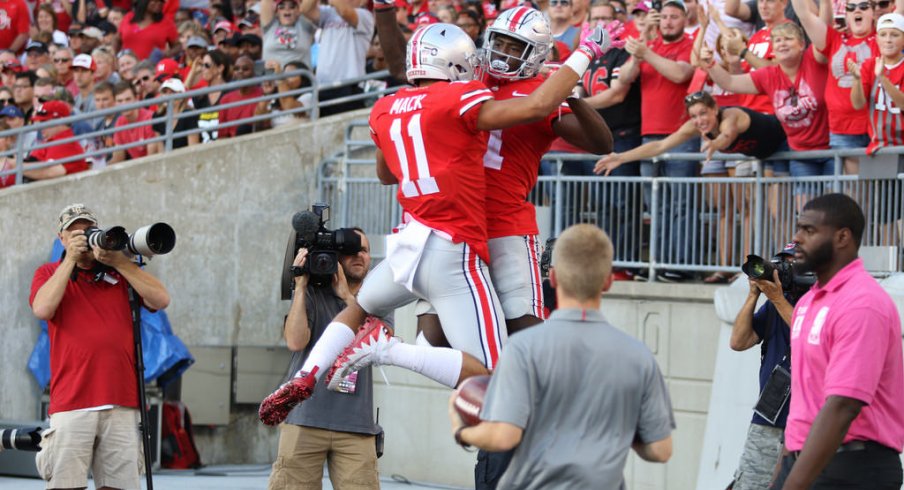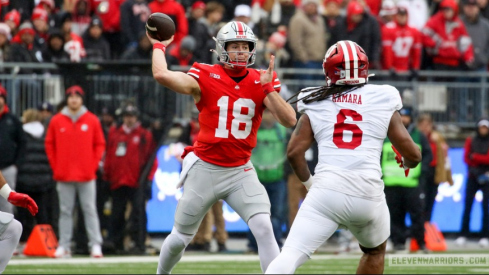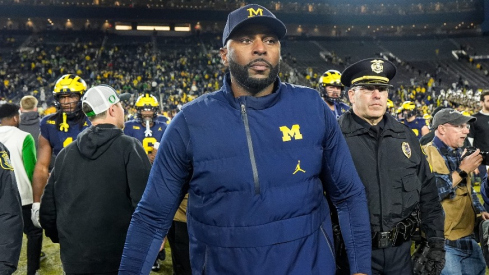Ohio State manhandled its fourth-straight opponent and hung 50 points in three-straight games. The box score is certainly a happy one to observe and the metrics we observe from the Maryland game tell a story of a program rolling after the Week 2 loss to Oklahoma.
Let's go inside the box score of the Maryland game.
Ohio State Now Leads the Country in TFLs
Fans tend to focus on the negatives. There's no shortage of them for Ohio State either, given the iffy play of the back seven and the drops among the wide receivers.
| RANK | TEAM | TFLs | TFL YARDS | TFL/G |
|---|---|---|---|---|
| 1 | Ohio State | 57 | 206 | 9.50 |
| 2 | Wake Forest | 55 | 196 | 9.17 |
| 3 | Penn State | 51 | 205 | 8.50 |
| 4 | Duke | 50 | 213 | 8.33 |
| 4 | Nevada | 50 | 184 | 8.33 |
That said, Ohio State fans never doubted that its defensive line is arguably the best in the country. It compares well to beastly defensive lines like the ones Alabama and Clemson enjoy. Fans might also be delighted to learn the 12 TFLs Ohio State had against Maryland catapulted it to No. 1 in the country on that metric, surpassing Wake Forest.
The distribution of TFLs through the season have been mostly consistent. Army stands out as a clear departure from this trend, but the nature of Army's offense makes TFLs difficult. Army can brute-force positive yards as well as any program in the country. Its disinclination to call passing plays as part of the core offense also drives down TFL opportunities for Ohio State's pass rush as well.
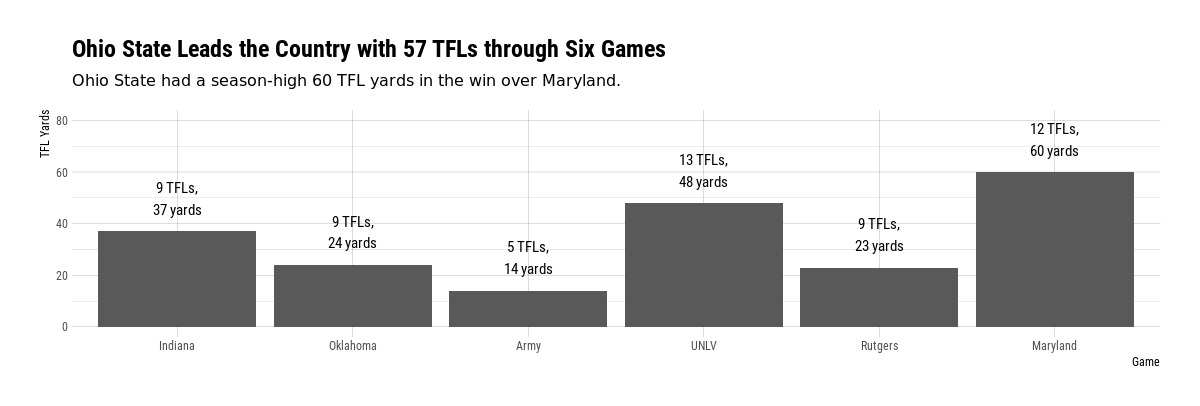
Nick Bosa leads the way for Buckeyes in TFLs with 10. That ranks him in a tie for No. 8 in the country. No other Buckeye has more than five TFLs (Sam Hubbard).
Pass Defense Started from the Bottom, Now It's Here
Ohio State understandably made a meal of the fact Ohio State had the dead-last passing defense in the country after the loss to Oklahoma.
The good news is that's improved. The hilarious news is that Ohio State has a top-20 passing defense after six weeks.
| Metric | Rank After Maryland | Rank After Rutgers | Rank After UNLV | Rank After Army | Rank After Oklahoma |
|---|---|---|---|---|---|
| Yards/Game | 17 | 42 | 67 | 102 | 130 |
| Yards/Attempt | 23 | 36 | 61 | 83 | 96 |
| Attempts/Game | 27 | 67 | 73 | 103 | 128 |
| Rating | 26 | 43 | 75 | 94 | 110 |
| Yards | 31 | 66 | 81 | 103 | 129 |
| Completion Percentage | 45 | 71 | 94 | 100 | 120 |
There's something to be said about improvement. Ohio State has certainly shown improvement since the Oklahoma loss, especially since Greg Schiano moved from the coaches' box to the field to better instruct his personnel. There's also something to be said about a regression to the mean. The pass defense we observed after two weeks, and certainly those two opponents, could be extreme outliers from what would otherwise be the Buckeyes' central tendency on pass defense.
Also, there's something to be said about the quality of the opponents. Army throws the football no more than 10 times a game. UNLV and Rutgers are abjectly terrible. Maryland is a nice outfit with two great road wins but was on its third-string quarterback.
That said, Ohio State fans should be happy if the improvement on those metrics we observe translates to a playoff-caliber team come December.
The Passing Offense Might Be the Best It's Ever Been
Ohio State fans may not appreciate the fact that its passing offense is on pace to be the best it's ever been since Meyer arrived in time for the 2012 season. However, this would be an accurate assessment of the passing game we've seen through six games.
| Season | Rank | Yards/G | 300-Yard Passing Games |
|---|---|---|---|
| 2012 | 105 | 181.5 | 0 |
| 2013 | 90 | 203.3 | 0 |
| 2014 | 52 | 247.1 | 4 |
| 2015 | 100 | 188.8 | 1 |
| 2016 | 81 | 213.9 | 3 |
| 2017 | 14 | 322.2 | 5 |
Compare the table of Ohio State's passing game through six games this season with the passing offenses as they finished the previous five seasons. The difference is clear. Ohio State's passing offense is averaging 75 yards more a game and already has one more 300-yard passing game than the passing offense in 2014, previously the best passing attack for the Urban Meyer era.
The differences this year are most pronounced relative to the past two seasons. Here, we see an immediate effect that Ryan Day and Kevin Wilson had relative to Tim Beck and Ed Warinner.
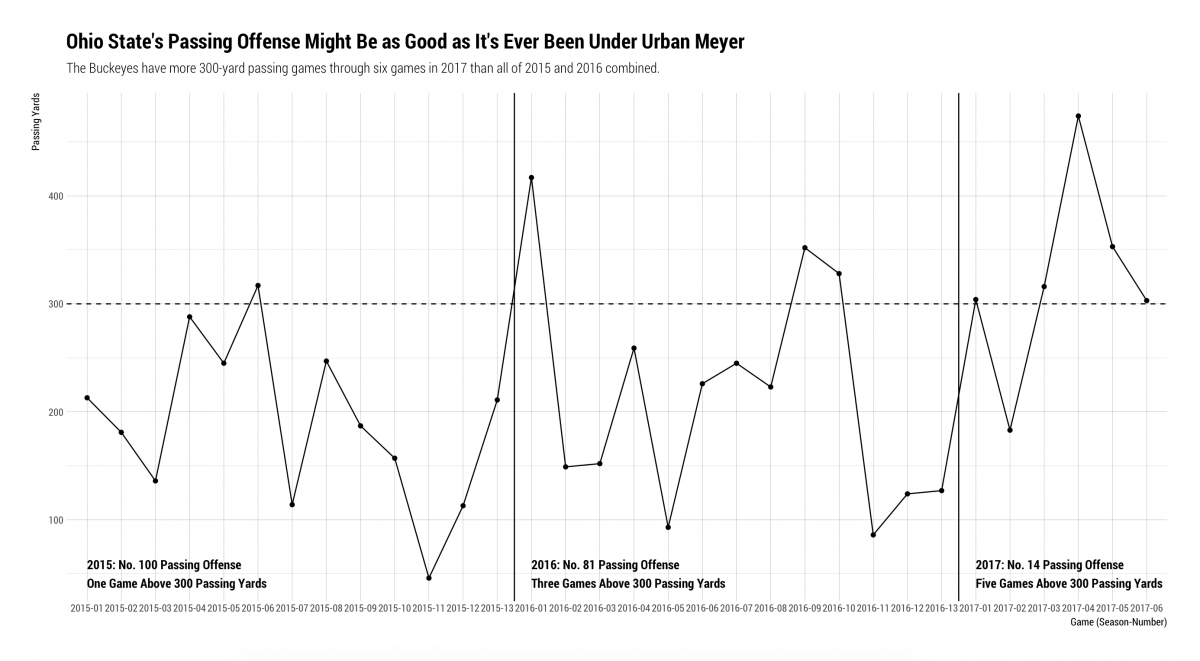
There are any number of explanations for this. For one, Ohio State has done well to mask limitations with the receivers (i.e. getting open downfield and drops) with underneath routes and easy throws to spring guys like Parris Campbell for bigger gains in yards after catch.
Two, the Buckeyes aren't relying on guys like Curtis Samuel and Michael Thomas to carry the load. The distribution of touches has been more egalitarian so far. It makes it harder for defenses to focus on one guy to shut down the passing game.
That said, Ohio State fans who rightfully complain about inopportune drops and an inability to connect on deep balls should see a bigger picture in which the passing offense is miles ahead of what it was in the past two seasons. It's also on pace to be the best Urban Meyer has ever had.
There's no shortage of areas for improvement, but improvement is already here.
